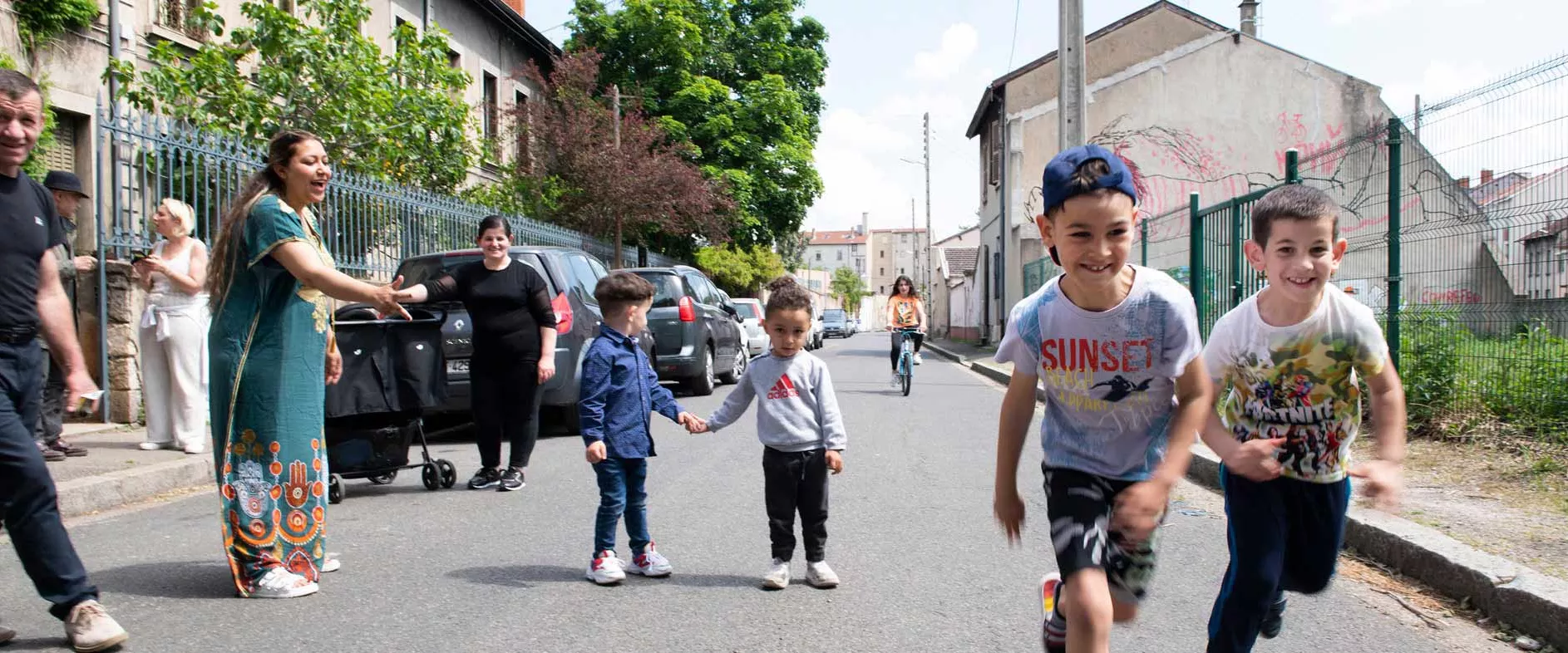
Converting rail buildings into emergency housing
Inaugurated in 2022 in the former Oullins heavy-maintenance facility, an emergency housing centre in La Mulatière offers a residence programme for refugee families until 2028. It’s one of many SNCF Immobilier projects that put the Group’s CSR policy into practice. Learn more.
Transitional urban development
SNCF Immobilier’s transitional urban development projects give new life to disused rail properties, converting them into shared spaces that meet the needs of local communities. How do our projects get started? What role do we play? Who are our partners? Anne-Sophie Courbière is Rental Development and Transitional Value Creation Manager at our Regional Property Management Office for South-Eastern France. She spoke with us about their emergency housing centre in La Mulatière, near Lyon.
What is SNCF Immobilier’s mission?
We optimize the performance of Group businesses by realizing economic gains, by modernizing industrial, rail, and tertiary assets, and by managing the carbon energy consumption of Group buildings. We also generate value from the Group’s real estate portfolio by identifying properties that are no longer needed for rail operations and using them to create energy-efficient, resilient, caring, inclusive cities, working in partnership with local governments. And we develop housing stock in local communities by modernizing existing properties and building new ones.
How do you reuse rail land?
The Value Creation units in our Regional Property Management Offices are responsible for either selling assets, or generating value by converting them into rental properties or transitional sites. Our projects vary widely—from leasing former rail buildings to industrial companies, to giving new life to disused rail sites by creating new community life spaces that meet local needs. And our overarching ambition is to build positive labour relations, environmental protection and social responsibility into everything we do.
 En savoir plus
En savoir plusWe’ve welcomed
4 million
visitors to our transitional urban spaces

More than
400 jobs
have been created on these sites by our partners

We’ve launched
40 projects
and transformed 100,000 sq m since 2015
How did the La Mulatière project come about?
The heavy maintenance Technicentre in Oullins is a part of French railway history. It sat along France’s first railway, between Saint-Etienne and Lyon, and was dedicated to the Paris–Lyon–Marseille line. Gradually, it specialized in locomotive maintenance, and later in repairing the electric motors that power trains. Today the buildings aren’t a good fit for rail operations, and a new Technicentre has been built in the nearby suburb of Vénissieux. That left La Mulatière largely idle. Of its 20 ha and 80,000 sq m of built space, only 4,000 sq m were being used—and even that was temporary.
And that’s what inspired you to repurpose it?
In addition to the maintenance workshops, the facility includes housing, a gym, a cafeteria, a health and social services centre, and more. These spaces are accessible from the street and easy to reuse. As we rehabilitated the rest of the site under France’s ICPE environmental protection regulation, we decided to use some of the buildings, including the former housing units. We offered them to Habitat et Humanisme, a Lyon-based non-profit that provides emergency and interim1 housing to vulnerable people.
How did your partnership with them come about?
We’ve had a partnership agreement with Habitat et Humanisme since 2020, so it was natural to offer the disused housing at La Mulatière to them. In September 2021 we signed an occupancy agreement, and the centre opened in March 2022. Around 15 families—roughly 60 people—have been living there since then. Most of them are refugees registered with the town’s social services.
How did you interact with local municipalities?
This project succeeded because of our very close ties with the Prefecture, local municipalities, Greater Lyon, and the towns of La Mulatière and Oullins. Offering housing is fine, but you also have to help the families assimilate, learn French, send their children to school, and so on. Each housing centre is tailored to the needs of its residents—from refugee families to single mothers and their children, people with disabilities, and deeply marginalized people. You need an ecosystem in place to help them find a place in the community.
How so?
For example, when some 20 children arrived at La Mulatière, we had to make sure that local schools had the resources to enrol them and give them a normal educational experience. That groundwork has to be laid in advance, so we act as an intermediary with municipalities. We and our partners build customized projects that work for everyone. That includes the French State, which provides the funding; the non-profit that operates the space; SNCF, which organizes housing based on the structure of the building; and the communities that support the project day in and day out.
Are there other non-profits involved?
United Riders occupies a small portion of the Oullins site. They make rounds, doing street outreach and distributing clothes to homeless people. And we host Sans Croquettes Fixes, a group that offers care to homeless people’s pets. We’ve also offered former SNCF workshop spaces to start-ups working in the social and solidarity economy. Today, La Mulatière is a transitional urban development site that aligns perfectly with SNCF’s CSR values.